Khamenei Promotes Islamic Unity, Attacks The US In Speech
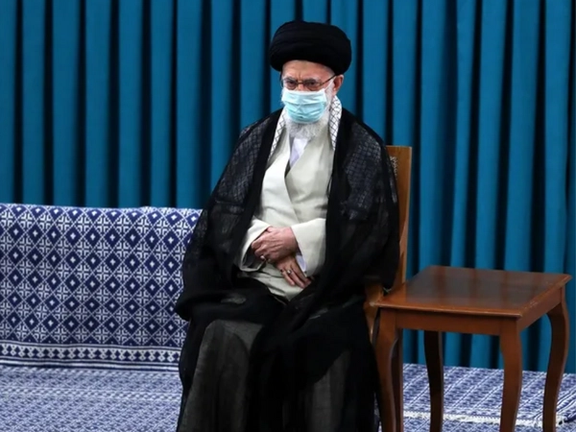
Iran’s Supreme Leader Ali Khamenei in a speech on Sunday did not mention nuclear talks with the West and focused on Islamic unity and anti-American statements.

Iran’s Supreme Leader Ali Khamenei in a speech on Sunday did not mention nuclear talks with the West and focused on Islamic unity and anti-American statements.
Khamenei who was speaking on Prophet Mohammed’s birthday to participants at a recent Islamic unity conference sponsored by Tehran, said that the Americans try to divide Sunnis and Shiites by highlighting their differences, while they are in fact against Islam.
He went on to accuse the United States of sawing discord among Muslims and alleged that recent terror attacks in Afghanistan was sponsored by Washington through the Islamic State group. Iran’s anti-Western leader claimed that the US has acknowledged that they are the ones who have created the extremist Islamic group.
Khamenei also argued that Islam is a “collective and not an individual religion”. He said that secular powers try to portray Islam as a religion for the individual, his beliefs and his conscience. They try to present Islam as a religion at the individual level, while it is in fact a religion pursuing social issues and fundamental human problems, he said.
Khamenei also underlined that Palestine is the most important factor for Islamic unity and criticized Arab countries that have established relations with Israel since 2020.
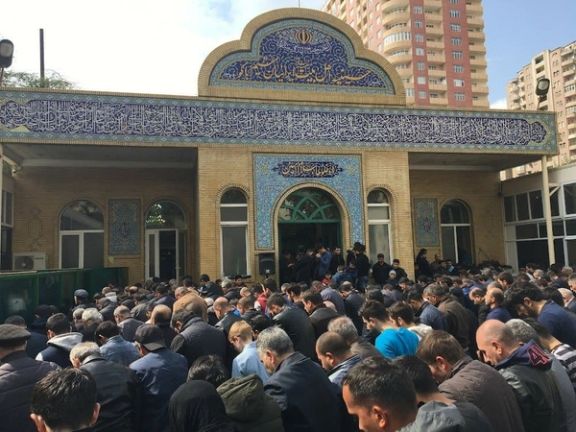
Azerbaijan's government has blocked Shia websites it says "engaged in Iranian and religious propaganda," following weeks of tensions between the two neighbors.
Tensions between Tehran and Baku, pumped up by media outlets, had appeared to ease since a phone-call between foreign ministers Hossein Amir-Abdollahian and Jeyhun Bayramov on October 13 and this week’s release of two Iranian truck drivers arrested on a transit road.
But Azerbaijani media reported Saturday that six websites − Deyerler (Values), Maide (Blessings), Ahlibeyt (Prophet's Household), Ehlibēt (also Prophet's Household), Shia and Islaminsesi (Voice of Islam) − had been blocked. Baku has not made an official announcement.
Deyerler is edited by Ilgar Ibrahimoglu, the previous imam of Baku's main Friday Mosque. The well-known and openly pro-Iranian imam also heads Defense of Freedom of Religion and Conscience, a non-governmental organization.
The website of the Stockholm-based Aznews (ANT) Television, which supports unity between Azerbaijan and the Azeri area of Iran it calls ‘South Azerbaijan,’ reported that Youtube channels carrying Iranian religious programs had also been blocked.
The Aznews website said Iran was breeding “terrorist groups in various countries under the guise of religion and religious sects to further its ideology.”
The relationship between Baku and Tehran has been fraught since last year’s war between Armenia and Azerbaijan, with Tehran uneasy over Azerbaijan’s territorial gains, Baku’s reported military relationship with Israel, and the alleged presence of Sunni militants shipped in from Syria by Turkey. Both Iran and Azerbaijan have recently carried out military maneuvers near the border.
Baku continues to detain four clerics who are members of the Assembly of Clergy of Azerbaijan and who were arrested last month, although it has released Ibrahimoglu, arrested at the same time.
On October 5 the Iranian embassy in Baku said Azerbaijani police had inspected an Iranian mosque in Baku, Iranian Husseiniya, and shut it down. The mosque, which is affiliated to the Iranian embassy, houses the office of Ali-Akbar Ojaghnejad, representative in Azerbaijan of Iranian leader Ali Khamenei.
The Iranian ambassador, Seyed-Abbas Mousavi, later said that the closure had not affected Ojaghnejad’s work, which is conducted in the same building. According to Azeri media, Ojaghnejad has returned to Tehran.
Azerbaijan, which has a population of around 10 million, is majority Shia but religious beliefs waned under decades of Soviet rule. While President Ilham Aliyev comes from a Sunni background, 49 percent of Azerbaijanis surveyed in 2010 by Gallup said religion was not an important part of daily life.
Last year’s war with Armenia stimulated Azeri nationalist sentiment both in terms of affinity with fellow Azaris in Iran, where they make up around 25 percent of the population, and with fellow Turkic peoples stretching from Turkey to the central Asian republics.
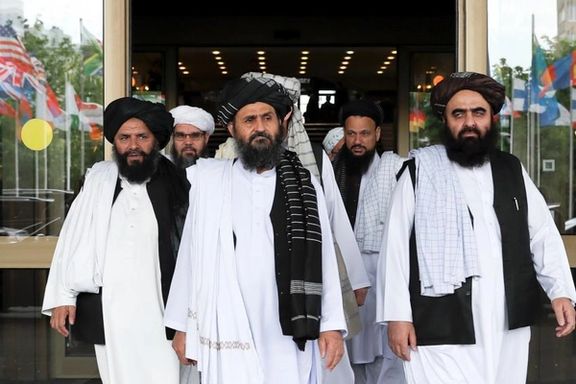
A top Iranian conservative paper has attacked potential recognition of Afghanistan’s Taliban government as "worse than a strategic mistake" and “dishonorable".
Jomhuri Eslami (Islamic Republic), one of Iran’s oldest newspapers, in a commentary Saturday suggested Tehran had decided to join Russia in recognizing the Taliban’s ‘Islamic Emirate of Afghanistan’ despite the group’s history of ‘terrorism’ and religious intolerance.
Russia has suggested it would recognize the Taliban if it met several conditions, including forming an ‘inclusive’ government and giving guarantees over human rights. Russia, and other states including China, have held off a decision while keeping diplomatic contact, much as the United States did in reaching its 2020 agreement with the Taliban over US military withdrawal.
The 2020 US-Taliban agreement saw the Taliban commit not to allow operations by militant Sunni groups like the Islamic State (Isis-Daesh). Tehran is likewise concerned over possible infiltration by Sunni militants, especially those linked to Isis and Baluchi separatists.
In a joint statement issued October 20, Russia, China, Iran, India, Pakistan and four central Asia republics – following a meeting of the ‘Moscow Format Consultations on Afghanistan’ established in 2017 – issued a statement viewing the Taliban as the new rulers "irrespective of the official recognition of the new Afghan government by the international community."
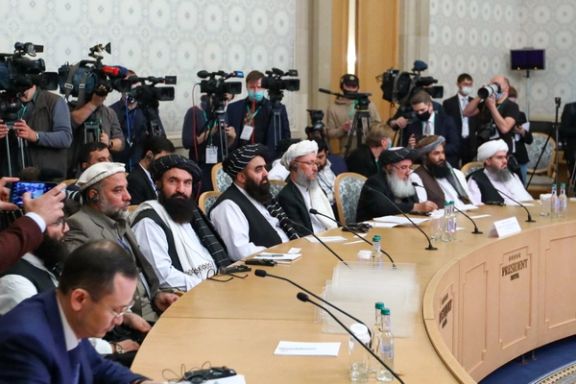
Reflecting disquiet in Tehran, a senior official in the Iranian foreign minister criticized "Russia's weak handling"of the Moscow Format talks and suggested the joint statement had not been agreed.
Jomhuri Eslami, which has resisted those in Iran arguing Tehran must deal with Taliban whether it wants to or not, in its commentary Saturday argued the Taliban would eliminate Persian as an official language and remove Shia religious jurisprudence from law, and that it was forcibly evicting Shiite Hazaras from their lands and denying women the chance to study and work. All this, the paper argued, showed the Taliban was not "worthy of recognition."
For Iran, which considers itself the leader of the Shiite world, the suppression of Afghan Shiites is anathema. Human Rights Watch (HRW) this week said that since taking Kabul in August, the Taliban had forcibly evicted thousands of Afghans from their lands.
Sunni-Shia war?
Last week Taliban Spokesman Zabihullah Mujahid expressed hope in an interview with Iran's Hamshahri newspaper that Tehran would soon recognize the Islamic Emirate of Afghanistan. Mujahid said the new rulers in Kabul had good relations with Iran, shared interests in trade and security, and was receiving “Iranian delegations.” He dismissed as propaganda reports of discrimination against Afghanistan's Shiite minority including the Hazaras.
Nour News, a website close to Supreme National Security Council Secretary Ali Shamkhani, in a commentary Wednesday said that "acting on the United States' behalf," Isis was trying to discredit Taliban declarations over security, entice a negative reaction from Iran, and fuel a Sunni-Shia war.
Nour cited the recent bombings at Shia mosques in Kunduz and Kandahar, killing at least 90 people, as evidence that Isis aimed at “heightening insecurities and causing ethno-religious conflicts.” Nour called on the Taliban “as promised” to offer support to Shiites taking on security for themselves.
Iran will host its own meeting of foreign ministers of Afghanistan's neighbors in Tehran October 27 and has invited Russia. Khairullah Khairkhwa, the Afghan minister of information, said Thursday that Kabul had yet not decided whether to attend.
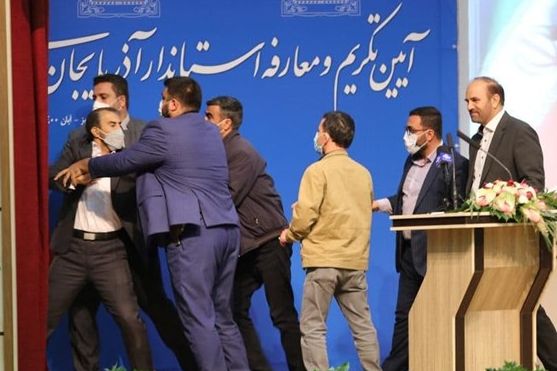
A former IRGC provincial commander who was recently appointed as governor was slapped by another military officer during his inauguration ceremony on Saturday.
Abedin Khorram who earlier this week was appointed as Governor of East Azerbaijan Province was slapped by “a member of the armed forces” in the presence of Interior Minister Ahmad Vahidi, according to Fars news agency affiliated with the Revolutionary Guard.
Fars, without naming the individual, said that he had a personal issue with Khorram, who offered another explanation to the state television.
The new governor said that the person who slapped him was angry because “a man [not a woman] had administered his wife’s Covid-19 vaccine”. According to Islamic rules, opposite sexes who are not immediate family members should not touch one another.
Khorram was asked how the person was able to enter the inauguration venue. He replied that obviously there was lapse of security and officials will investigate that.
Iran’s President Ebrahim Raisi (Raeesi) has appointed many IRGC officers in top positions, which has led to criticism by many. Khorram was commander of Revolutionary Guards in the same province until he was appointed governor.

The leader of Lebanon's Hezbollah on Friday warned Israel against drilling for oil and gas in the disputed maritime border area until the issue is resolved.
Hezbollah would take action if Israel did so, Hassan Nasrallah, the leader of the Iran-backed group warned.
"If the enemy thinks they can act as they please before reaching a solution to this issue they are wrong," Nasrallah said in a televised speech.
Lebanon's cabinet had raised the question to the United Nations permanent representative after Israel granted US oilfield services group Halliburton an offshore drilling contract in the Mediterranean, asking to clarify whether the drilling would take place in disputed areas.
Lebanon and Israel are in dispute over the delineation of their territorial waters and negotiations could lead to Lebanon being able to unlock valuable gas reserves amid its worst-ever financial crisis. Israel already pumps gas from huge offshore fields.
The two countries have been holding on-off US mediated talks since October 2020 to try to resolve the issue.
"I will not state any positions on this as I don't want to complicate the negotiations but for sure the resistance in Lebanon…when it finds that Lebanese oil and gas is in danger…it will act accordingly," Nasrallah said.
The US mediator for the indirect talks, Amos Hochstein, visited Beirut this week and said a period of shuttle diplomacy would proceed any return to indirect talks between the two countries.
Reporting by Reuters

Iranian President Ebrahim Raisi recently said Iran’s car industry should apply the technology, and show the motivation, developed under sanctions in the arms sector.
"Our military and nuclear industries have been subjected to the worst sanctions, but we have made great achievements because we have acted as if we were doing motivated jihad (effort) to make progress," he said, during a visit to Bushehr province October 8.
Raisi went on to reply to those who he said asked why Iran could build missiles but faced problems with automobiles. "The answer is clear − because we have not invested the technology of the missile industries in the automotive industry.”
Raisi’s comment could have applied to the Soviet Union’s centralized economy where the country could compete with the United States in weapons and space exploration but was unable to produce quality kitchen appliances or cars.
Iran's automotive industry, the county’s largest after oil and gas, employs 700,000. It was valued in 2020 at $26.4 billion by India-based Modor Intelligence, which forecasts 10 percent sectoral annual growth to 2026. This would be possible without sanctions and with new infusion of investments and foreign partnerships. The analysts attributed a recent decline in growth to Covid-19 and United States sanctions.
French companies Peugeot and Citroen withdrew from substantial joint projects in Iran when the US introduced ‘maximum pressure’ sanctions in 2018, but Iran, reports Motor Intelligence, “is taking the necessary actions to boost the production of vehicles and parts locally to meet the demand for vehicles and reduce its import cost.”
Intelligent cars
Speaking to the Iranian Students News Agency (ISNA) Friday, Deputy Chief of Iran's traffic police, Brigadier-General Taymour Hosseini said road accidents were occurring due to inadequate safety standards as Iranian companies struggled to keep up. "Big companies in the world are working on intelligent cars but we have dropped our expectations so much that we are happy with having anti-lock braking systems,” he said.
With around 20,000 annual deaths, Iran has a poor traffic safety record. According to World Health Organization (WHO) data published in 2018, road traffic accidents deaths in Iran reached 21,831 or 6.5 percent of all fatalities.
The WHO said in fact-sheet published in June that93 percentof world road fatalities occurred in low- and middle-income countries, which have only 60 percent of the vehicles. “Road traffic injury death rates are highest in the African region,” with traffic accidents globally “the leading cause of death for children and young adults aged 5-29 years,” the WHO noted.
Iran's trade officials say neighboring Iraq, once along with Syria a thriving market for Iranian vehicles, has rejected Iranian vehicles due to their failure to meet the required standards. Hamid Hosseini, former secretary of Iran-Iraq chamber of commerce told Fararu website that Iraqis were particularly concerned about airbags, fuel consumption and braking systems.
"Special attention should be paid to safety issues and quality if this administration seriously wishes to export automotive products,” Hosseini said. “Otherwise exporting vehicles will not happen," he claimed. Hosseini also said that higher standards in Iraq meant that it would no longer be possible to produce vehicles in Iraq even if US sanctions were lifted.
According to the latest figures, in the past five months Iran has exported only 514 vehicles due to various reasons, including international banking issues resulting from US sanctions.